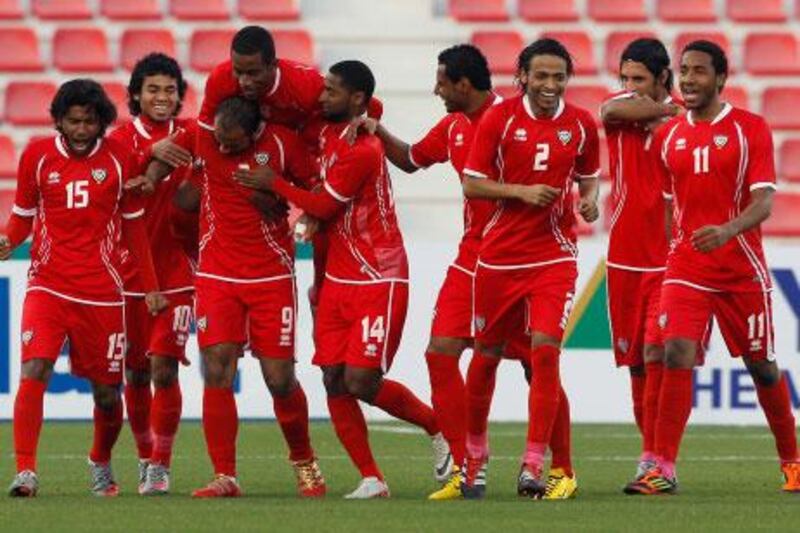DOHA // What a difference a goal makes. Ahmed Ali's 30-yard rocket three minutes into a win-or-stop-dreaming match with Iraq was the perfect tonic for a UAE Olympic team that had been dogged by bad luck, injuries and an inability to score.
It was the UAE's first goal in four Group B qualifying games but it was enough to give them a 1-0 victory over Iraq at Al Arabi Stadium in Doha last night, lifting them to second in the group and returning them squarely into contention for a berth in the London 2012 football tournament.
"Thanks to the players for what we did today," said Mahdi Ali, coach of the Under 23 team. "Thanks to the coaches and staff. Thanks to everyone.
"We played like we wanted; we planned to press in the beginning and we scored in the first five minutes and played very well after that.
"Ahmed's goal was fantastic, especially because one month ago I was with him during his treatment in Germany. He promised me he would score in this game. I want to thank him, especially."
The 22-year-old forward has missed almost the whole of the 2011/12 season for Baniyas, his club, because of a tibia injury. The entirety of his Baniyas contribution this season: one reserve team match, one goal. And now one outsized goal, one that brings London back on to the team's radar.
The UAE are home to Australia on February 22, and conclude group play away to Uzbekistan on March 14. The winner of the group secures a berth at London 2012. The runner-up enters a three-team Asia play-off in Vietnam later in March, and the survivor faces Senegal in Coventry in England in April for the last football place at the London Games.
The victory was all the more impressive in that it came without Hamdan Al Kamali, the former Olympic team captain who has joined Lyon; the first-choice striker Ahmed Khalil, who has an injury, and Omar Abdulrahman, not quite ready to return to action after knee surgery. The coach said all three could be available for the Australia game.
The early goal helped the UAE shrug off some of the weight of expectations that had surrounded them after the wave of disappointment that followed a 2-0 defeat to Iraq in Al Ain in November.
"These players, after losing the game to Iraq at home, so much pressure was on the them, from the media, from everybody, and I don't know why," Mahdi Ali said. "Now, they have gained this experience of how to play under pressure."
The UAE, the smaller but more skilled side, also had strong performances from Khalid Essa, who made several fine saves but none bigger than his block of a sharply struck header a second ahead of the final whistle, and the midfielder Amer Abdulrahman and the forward Ali Mabkhout, who was always dangerous.
The game was in Doha because security concerns prompt Iraq to play "home" matches anywhere but Iraq.
"Yes, if we play in Baghdad or one of our home stadiums, we can create pressure on the UAE team," said Radhi Swadi, Iraq's coach. "But the Iraq national team has been playing outside the country for 20 years. We are conditioned to this, and it is not why we lost.
"The concentration of our players wasn't very good, and the first goal put pressure on us to try to draw."





